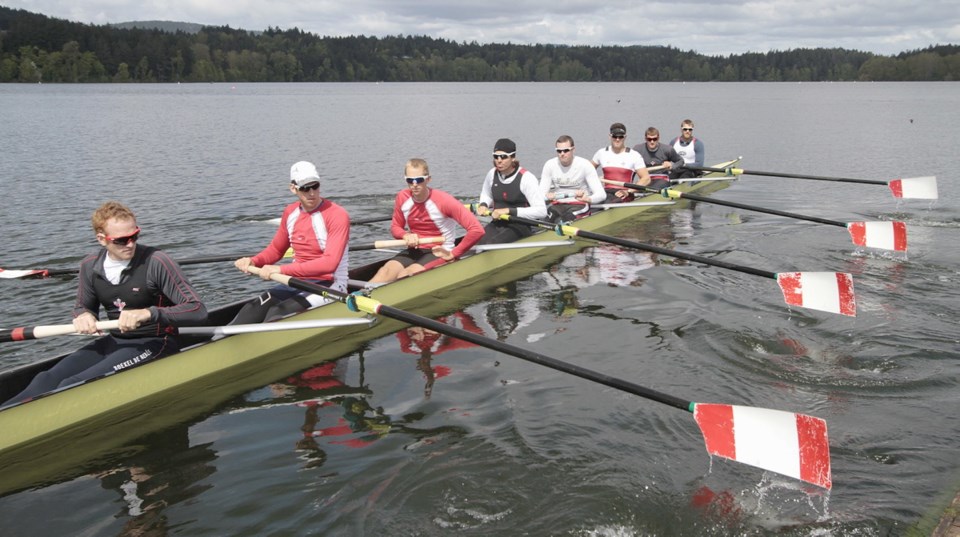The Canadian team has hit the water this week in Plovdiv, Bulgaria, for the 2018 world rowing championships.
But it’s what is happening off the water that is making waves as Rowing Canada contemplates a move away from its long-standing actual and spiritual home base of Elk Lake, out of which have come most of the 26 Canadian Olympic rowing medals since 1984.
With the multi-use Elk Lake becoming crowded, especially over the summer season, a call for proposals from Rowing Canada went out in the spring for communities wishing to host the national team.
It came as a shock to those in the rowing community on Elk Lake. Go anywhere across Canada, they say, and the one sport most mentioned in association with Greater Victoria is rowing.
The Island, however, remains in the hunt with two of the five proposals expected to be submitted by Friday’s deadline. A Lower Island group is proposing a revamped national team training centre that would utilize Elk Lake, Shawnigan Lake and Finlayson Arm.
“We walked them [Rowing Canada officials] up to Finlayson Arm. It’s got good distance for rowing. It’s calm and it’s not so busy in terms of usage. It’s a potential site for sure,” said Langford Mayor Stew Young.
“Langford does as much as it can for Olympic athletes. We’re known for that. We’re working with Rowing Canada as part of a regional perspective. But Rowing Canada will do its due diligence.”
North Cowichan is proposing Quamichan Lake, which has already been used by the national team for training on a part-time basis.
“It would be a beautiful fit with North Cowichan’s culture of outdoor recreation and activity, and a real opportunity for the young people of the Cowichan Valley to be inspired by Olympic athletes,” said North Cowichan Mayor Jon Lefebure.
“[Quamichan] has the perfect attributes. It’s the right size with not a lot of [conflicting] usage. And we have a long history with the Maple Bay Rowing Club. Our commitment is to provide the space [for a boathouse] in Art Mann Park.”
A group on the Lower Mainland is preparing to put forward Buntzen Lake in Anmore, which is near Port Moody.
The other two proposals will be from Ontario, including London, which face the fact of being unavailable through much of the winter when crucial base training is done on water.
There are 47 athletes, seven coaches and eight support and medical staff on the Canadian team to the 2018 world championships in Plovdiv. There is also a further contingent of administrative staff at Rowing Canada’s current headquarters in Saanich. Add in the national B team and national U-23 team athletes and coaches, and it would be the equivalent of a mid-size company of about 200 leaving Greater Victoria if the national training centre is moved. That is an influx, however, that North Cowichan, Anmore or communities in Ontario would relish.
“It would be a huge benefit to our community,” said Lefebure.
“And there would be less expensive housing in the Cowichan Valley than in Victoria or the Lower Mainland. That is important for national-team athletes, who are not all that well off.”
Previous national team configurations have had all the rowers based at Elk Lake followed by an arrangement in which the men’s team was based at Elk Lake and the women’s and lightweight teams in London, Ont.
All the national team rowers, however, have been at Elk Lake since last year, where they will remain in the lead-up to the 2020 Tokyo Olympics. The decision by Rowing Canada on what happens post-Tokyo is expected in October or November when it examines all the proposals.
“It’s a really good idea to have all the athletes in one location,” said Rowing B.C. executive director Dave Calder.
In his position, the 2008 Beijing Olympic silver medallist is obviously advocating for the B.C. proposals over those from Ontario.
“The ability to row year-round would be a wise decision,” said Calder.
But will it be back on Elk Lake, supplemented by Shawnigan Lake and Finlayson Arm, or on Quamichan Lake or Buntzen Lake?
“I hope the decision makers take into account what’s best for the athletes,” said Calder.
Elk Lake retains a sentimental tug for many in the sport. It is really the only choice, says 2004 Athens Olympic silver-medallist and UVic Vikes women’s rowing head coach coach Barney Williams.
“Elk Lake is still the best place for the national team to row in every sense,” he said.
“It’s year-round, has community support and a history that has allowed athletes for many years to pursue their Olympic dreams. It ticks all the boxes.”
The Elk Lake/Shawnigan Lake/Finlayson Arm advocates also point to the extensive Canadian Sport Institute and Pacific Institute for Sport Excellence systems of support in Greater Victoria to which national training centres for Triathlon Canada, Swimming Canada, Athletics Canada, Cycling Canada, Golf Canada, Tennis Canada, Surfing Canada, Rugby Canada and Field Hockey Canada are also hooked into.
At the world championships, Canada is up against countries that have large bodies of water dedicated to only their national-team rowers. Canadian rowing fears falling behind because of it.
None of the Canadian proposals, however, is asking for rowing exclusivity on the respective bodies of water.



